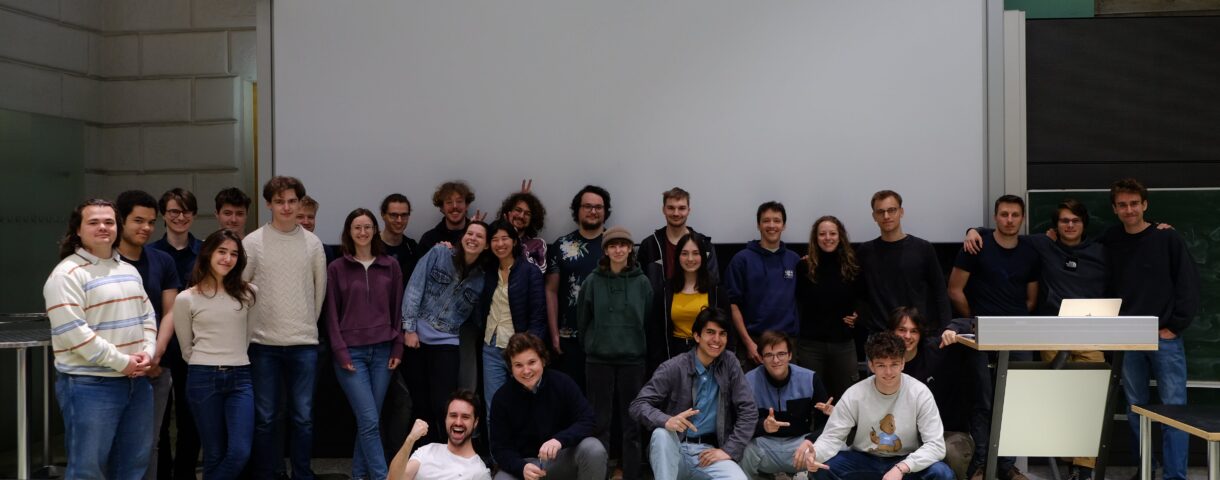And once again, another legendary Plancks weekend came to an end far too quickly. But what exactly happened?
This year again – just like the year before – eight teams competed for the coveted victory and with it, the sponsored (!) international spot in Barcelona. We counted five teams from Graz (Uni and TU), two from TU Wien and Uni Wien, and one team from Linz. We were especially happy to see many familiar faces again.
After a short welcome with sandwiches that were immediately devoured (I didn’t get a single one), things got underway. But before it really started, we were shocked to discover that the young people’s calculators can now not only integrate but also diagonalize matrices. We had gotten old. The calculators of our youth didn’t even have a sine button. We decided to solve the problem by requiring intermediate steps when integrating.
After this minor incident, the participants were led to their respective rooms, where they had to solve nine very challenging problems under supervision. A total of 102 points could be earned – a challenge that would have been tough even for Einstein. Matthias, Johannes, Martin, and Markus Aichhorn, the authors of the problems, were definitely at the top of their game. The problems spanned all areas. A falling conducting loop, bouncing balls, ion traps, neutral atoms in a laser field, relativistic quantum mechanics, a pulsar… enough to make any true physics fan’s mouth water.
After grappling with countless sub-parts, it was time – once again – to eat. Wait, before that, there was a pub quiz that Hannes, our good soul (who also produced the legendary trailer – yes, the one that still echoes in our heads today, see ), lovingly put together with ChatGPT. Almost all questions revolved around particle physics. The theme was “The Standard Model.” ChatGPT might be getting tired, too.
Then, finally: off to the much-anticipated dinner at Gösser Bräu. The menu was very hip, almost alternative: goulash, schnitzel, and cheese spaetzle. The winners of the Pub Quiz even got an alcoholic drink on the house. When Lukas entered the room, the president of the Pauli association finally got the applause he deserved for his fantastic organization! After that, all participants were forced to follow us on Instagram and watch the trailer. Since Lukas and I hadn’t managed to do any calculations that day (but still really wanted to), we had to stress multiple times that spoilers would be punished by death. This threat was effective, and the problems weren’t discussed during dinner.
Not to be overlooked were the efforts of Matthias and Martin – the unpopular coach from the trailer – who continued grading the problems later that evening after dinner.
As we happened to walk past a window, we witnessed Martin having a meltdown because a team hadn’t written their name on the answer sheet. Even though the handwriting made it pretty clear who it was, he just couldn’t stop fuming.
The next day began with the solution discussion, during which Matthias solved all nine problems in 50 minutes – impressively demonstrating that the problems actually weren’t that hard after all.
Before the award ceremony, there was a cheese platter, for which I had gone to XXXLutz the day before (!) to buy a board to serve it on. Again, I didn’t get a single piece. One could reasonably question the participants’ manners at this point. But okay, maybe we should’ve just bought more.
The award ceremony itself was hardly lacking in suspense. Bar charts shot up – only to stop just short of the red line. Once again, the professors couldn’t be beaten. That hurts. With 21.5 points, they came out ahead of My Personal Favorites. (That’s not a grammar mistake – that’s actually the team name of Dani, Jan, Olga, and Mira, who – just like last year – won the competition and thus earned the fully sponsored trip to Barcelona. Represent Austria with pride!)
With 15.25 points, they narrowly beat Die Menseraner from Linz, who had 14 points, and the team Vectorious, also with 14 points. Especially noteworthy was the performance of My Personal Favorites on Problem 1, where they scored an impressive 7 points. No other team achieved so many points on a single problem. Maybe the problems were indeed a bit too tough…
A big thank you, of course, goes to all three professors: Markus Aichhorn (who also contributed a problem), Enrico Arrigoni, and Viktor Eisler. Without you, the event would have been only half as fun! Lukas and I also tried our hand at the problems on the Thursday after the Plancks weekend. By then, we already knew they were quite tricky, so we had a slight – but unfair – advantage. Still, let it be said: even we wouldn’t have beaten the professors.
Because just like last year: Enrico delivered a brilliant performance again. On the second problem, the average score was about 2.0, but he scored 9.5 points. The analytics wizard struck again and defeated Kapitza’s pendulum. He’s already announced that he’ll be back next year. We’re excited!
But if we’ve learned one thing, it’s this: the true hero of this competition lives in Silicon Valley and was trained on 10^14 tokens (one order of magnitude more than Viktor Eisler, the Hungarian robot). ChatGPT scored 70% of the points. The only person who managed to beat it on one problem (namely Problem 2) was Enrico.
Next year, we’ll move on to Vienna, where we’ll try our best to assemble a professor team. Maybe it’ll be: VIENNA VS GRAZ! In this spirit: See you next year at an event that’s sure to be even cooler.
We can’t wait. We hope to see all teams again – and that we’ve managed to inspire you to start training. The professors probably are by now. So you’ll have to work twice as hard.
See you next year,
PAULI!

